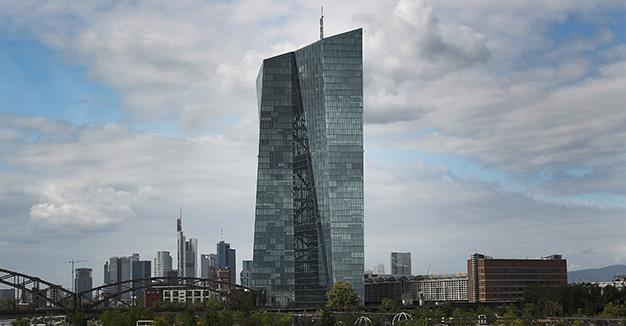Strong euro no problem while economy grows: ECB
FRANKFURT - Agence France-Presse

AFP photo
The European Central Bank believes its long-term support to the eurozone economy will overcome the strong euro’s braking effect on inflation, board member Benoit Coeure said on Sept. 11.Compared with previous central bank interventions, monetary policy “will remain more accommodative for longer,” Coeure told a Frankfurt conference, compensating for the impact of the euro’s appreciation.
The ECB’s historic low interest rates and 60 billion euros ($72 billion) of monthly bond purchases are designed to boost growth in the 19-nation single currency area, driving inflation towards policymakers’ goal of just under 2.0 percent.
Some observers have sounded the alarm as the euro appreciates against the dollar.
They argue that the stronger single currency will slow growth by making eurozone exports more expensive abroad and slow inflation directly by making imports cheaper.
The euro has strengthened in recent months as growth has picked up in the European economy, but currency markets are also pricing in their expectations that the ECB will begin winding down stimulus in the coming months.
ECB President Mario Draghi said last week that central bank governors would decide in October on the next steps for their “quantitative easing” (QE) bond-buying programme, currently slated to expire at the end of the year.
How the euro develops against the dollar will flow into policymakers’ decision-making as their October meeting approaches.
Coeure argued on Sept. 11 that the ECB’s continuing interventions in the economy would “offset, at least in part, the disinflationary effects of a stronger currency”.
But “exogenous” shocks -- originating from outside the single currency area -- would likely have “undesirable consequences for the inflation outlook” as access to financing tightened up, Coeure added.
“This statement reflects the ECB’s confidence, especially in the eurozone’s ability to confront a stronger exchange rate, and suggests that the QE program is set to be wound down from early 2018 barring any new shock,” analyst Frederik Ducrozet of Pictet Wealth Management told AFP.
And it “suggests at least that the ECB has not reached its pain threshold with the euro close to $1.20,” he added.
ECB policymakers have repeatedly insisted that they do not target the exchange rate, with the institution’s mandate extending only to the rate of inflation.
















